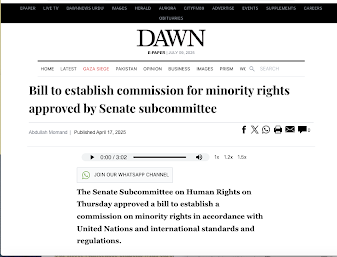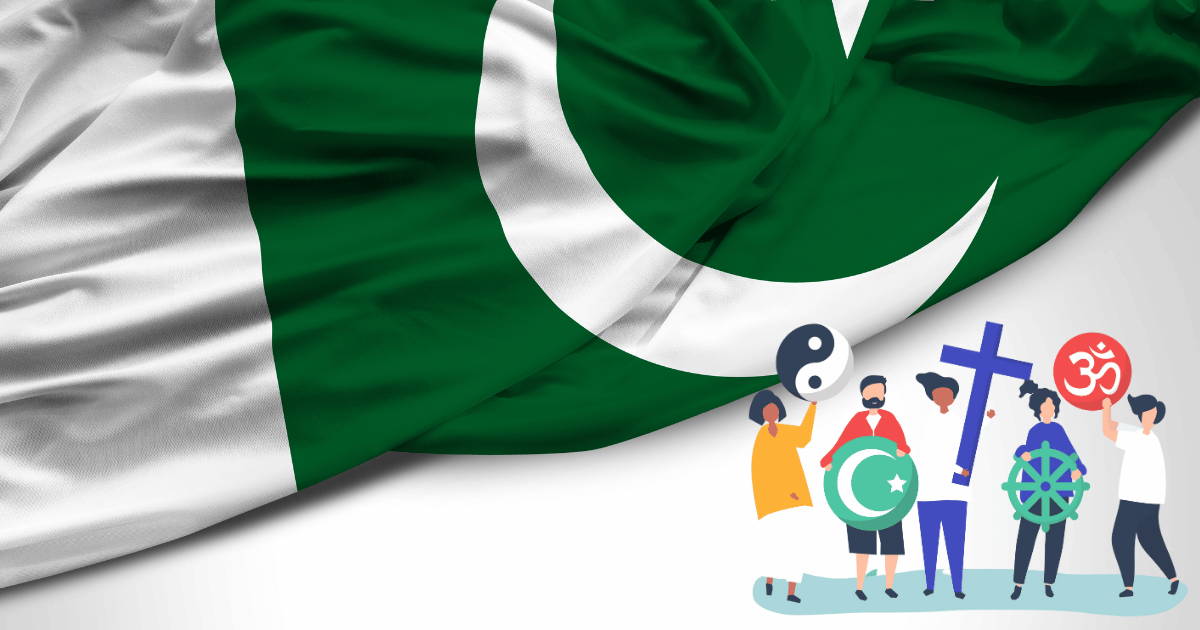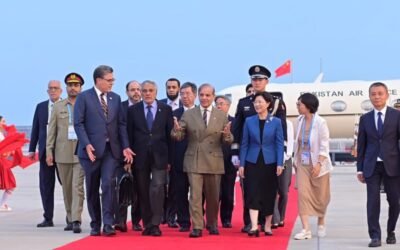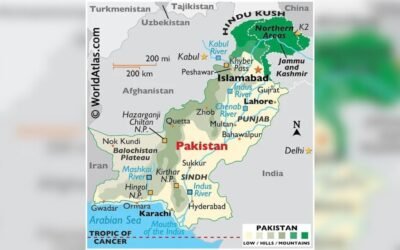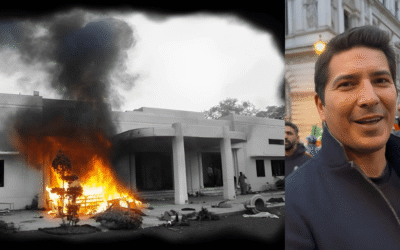Introduction: Fair Treatment for Everyone
Pakistan was founded on the idea of justice for all. This means protecting the rights of its religious minorities. It’s not just a rule in our Constitution; it’s also a moral and Islamic duty. Pakistan was established to help those who faced hardships due to their religious beliefs. So, it must ensure safety and inclusion for everyone living here. This includes Hindus, Christians, Sikhs, Ahmadis, Kalash, and others.
The Holy Quran teaches, “There is no compulsion in religion” (Surah Al-Baqarah 2:256). Also, Prophet Muhammad (peace be upon him) protected religious minorities. He did this in the Charter of Madinah. These teachings demand that all people be treated fairly and with respect. Their faith should not matter.
Pakistan’s Laws for Minorities
The Constitution of Pakistan promises several important rights:
- Article 20: People are free to believe in and practice their religion. They can also manage their religious places.
- Article 25: All citizens are equal before the law. The law prohibits unfair treatment based on religion, race, or gender.
- Article 36: The government must protect the rights and interests of minorities. This includes making sure they are represented in government jobs.
Pakistan has also signed global human rights agreements. One example is the International Covenant on Civil and Political Rights (ICCPR). This shows Pakistan’s promise to protect its minorities.
Today’s Situation: Where We Stand
The Pakistan Bureau of Statistics (PBS) 2023 census shows Pakistan has over 241 million people. About 3.65% of them are religious minorities. This means around 8.8 million citizens are non-Muslims. The largest groups are:
- Hindus: About 3.8 million. They are the largest minority group in Pakistan, according to the 2023 census.
- Christians: About 3.3 million.
- Ahmadis: Around 0.16 million. (Ahmadi communities often estimate their numbers to be higher.)
- Sikhs, Kalash, Parsis, Baháʼís: Their numbers are in the thousands. For example, the 2023 census counted 15,998 Sikhs and 2,348 Parsis.
These groups are vital to Pakistan. They work in healthcare, education, government, and the military. But, they still often face unfair treatment, mob violence, or don’t have enough say in decisions.
Problems Minorities Face
- Mob Violence and Misuse of Blasphemy Laws: Blasphemy laws are a big problem. Groups like the Centre for Social Justice (CSJ) report many accusations. There were at least 1,472 accusations from 1987 to early 2021. This number keeps growing. People often use these laws for personal revenge or land disputes. In August 2023, churches and Christian homes in Jaranwala were attacked. This occurred after a false accusation of blasphemy. The government itself stated that 53% of blasphemy complaints from 2018 to 2023 were found to be untrue.
- Forced Conversions and Marriages: This is a very sad issue. It mainly affects young Hindu and Christian girls. Reports from minority rights groups and news like DAWN show over 1,000 cases of forced conversion between 2019 and 2022. These mainly happened in Sindh and Punjab. Girls are often kidnapped, forced to convert, and then married to older men. This breaks laws against child marriage and human rights.
- Limited Political Say: Minorities have special seats in government. But these seats are often chosen indirectly. This means the chosen people don’t always truly represent their communities. The majority still make most decisions. Many minority groups advocate for direct elections to ensure their voices are genuinely heard and represented.
- Access to Education and Jobs: Minorities, especially those in rural Sindh and South Punjab, often lack access to quality schools, scholarships, and fair job opportunities. Job ads sometimes openly ask for non-Muslims for sanitation work. This highlights unfair practices that need to be addressed promptly.
Islam’s Example: Living Together in Peace
Islam’s early history shows how non-Muslims lived with respect. Prophet Muhammad (peace be upon him) and Caliph Umar (may Allah be pleased with him) set this example. The Charter of Madinah gave equal rights to the Jewish people of Madinah. During Caliph Umar’s time, taxes were used to protect all citizens, not to mistreat them. Caliph Umar even quickly helped a Christian man whose land was taken wrongly by a governor. This shows a strong focus on justice. So, Pakistan’s Islamic identity should make it stronger in protecting all faiths, not weaker.
Good Changes Happening
Even with problems, some reasonable steps have been taken:
- Kartarpur Corridor: This opened in 2019. It lets Sikh pilgrims visit their holy site in Pakistan without a visa. This was seen as a sign of peace worldwide.
- Supreme Court Orders: In a big decision in 2014, Pakistan’s top court ordered the establishment of a National Council for Minorities. It also stated that special police units should be established to protect minorities. This came after a church bombing in Peshawar.
- School Reforms: The Single National Curriculum (SNC) now includes sections that promote religious tolerance. It also highlights the positive contributions that minorities have made to Pakistan. This helps build a more inclusive story for the future.
- Restoration Projects: Historic religious sites for minorities are being restored. Examples include the Shiv Temple in Mansehra and the Gurdwara Panja Sahib. This shows a commitment to protecting their history and faith.
Ideas for Better Inclusion
To truly achieve justice for all, Pakistan needs more changes:
- Reform Blasphemy Laws: Enact robust regulations to prevent false accusations. Make sure investigations are fair. And punish those who make false claims.
- Law Against Forced Conversion: Pass a national law to protect young girls from religious exploitation. This law should ensure that conversions are truly made by choice.
- Inclusive School Books: Keep checking and updating school books. Ensure they teach tolerance and showcase the diverse contributions of all Pakistanis.
- Job Quotas with Checks: Strictly adhere to job quotas for minorities in the government. Check hiring processes to prevent unfair treatment.
- Faster Justice: Set up special courts for hate crimes and forced conversion cases. This will ensure that victims receive quick and fair justice.
- Minority Voice in Media: Support and fund media run by minorities. This includes radio, newspapers, and online platforms. This will help their voices be heard.
A significant step forward occurred on May 13, 2025, when the Pakistan Parliament passed the National Commission for Minority Rights Bill 2025. This new law aims to establish a powerful body to monitor and ensure the protection of minority rights nationwide. As reported by Herald Malaysia (originally from UCA News), this bill grants the commission significant powers to summon witnesses and initiate inquiries, marking a crucial step towards stronger legal protection for all citizens.
Conclusion: Moving Towards a Just Pakistan
A country’s true greatness is not its power. It is how it treats its weakest people. For Pakistan to follow the vision of Quaid-e-Azam Muhammad Ali Jinnah, minorities must feel safe, valued, and integral to the nation.
Our faith, our Constitution, and our conscience all tell us the same thing. We must work for justice, not just for ourselves, but for all our fellow citizens. A more united, peaceful, and respected Pakistan will begin when we treat our most vulnerable citizens with care.
- National harmony Conference 2025 promotes interfaith unity in karachi
- Pakistan Enacts Law to ensure religious minorities rights
